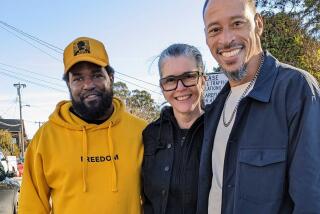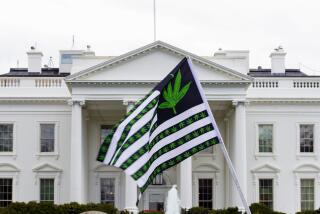Man who killed bald eagles wins a pardon from Bush
ST. LOUIS — Leslie Owen Collier was at a livestock auction when his cellphone rang. It was the White House.
Twelve years after pleading guilty to federal charges in the deaths of three bald eagles, Collier learned his name was cleared: He was pardoned by President Bush.
“I guess I was humbled is the best way to say it. I never thought it would happen,” Collier, 50, said in a phone interview. “It was emotional. I almost came to tears.”
Collier was among 14 people pardoned by Bush last week. The president has granted 171 pardons overall -- less than half as many as Presidents Clinton and Reagan.
Collier’s life changed in 1995 when he noticed an increasing number of wild turkeys, which were thought to have died off in the area.
“I got it in my head that if I eliminated some of the coyotes it would give the turkeys a jump-start” on their comeback, said the farmer from the Charleston area of southeastern Missouri.
So he put out hamburger meat laced with the pesticide Furadan in an effort to kill the coyotes. It worked; seven coyotes died. But when eagles fed on the coyotes’ carcasses, they died too. So did a red-tailed hawk and a great horned owl, among other animals.
The birds are federally protected, and killing them is illegal. Collier said the crime became a felony when a second eagle died. He pleaded guilty in late 1995 and received two years of probation.
Though he didn’t go to jail, the conviction was hard on Collier. He was ordered to pay $10,000 in restitution. As a convicted felon, the longtime hunter had to give up his guns.
Beyond that, there were the occasional news articles and Web postings referring to Collier as the guy who killed bald eagles, America’s national bird. Sometimes he would get looks that were difficult to ignore.
“For a while, you think people kind of look at you different,” Collier said.
But many in and around Charleston, a town of about 5,000 residents, thought Collier was penalized too harshly because he clearly didn’t intend to hurt the eagles.
Among those in his corner was Lanie Black, then the state representative for the region, as well as a family friend.
The men attend the same church, where Black teaches one of Collier’s three children in Sunday school.
To Black, the prosecution of Collier never made sense.
“Everybody down here feels he was taken advantage of by a bunch of slick-tongued lawyers and prosecutors,” Black said.
So Black and other supporters began writing letters seeking a pardon. Several months ago, U.S. Atty. Catherine Hanaway contacted Black and requested the full story. A pardon attorney for the Justice Department had asked Hanaway for input about the possibility of a pardon.
Hanaway said she spoke with federal prosecutors familiar with the case, with the judge, even with people in the Charleston area. “By all accounts . . . he is a pillar of the community,” she said.
Collier said he didn’t hear anything else until last Monday. He feels vindicated and relieved that his name is cleared.
“What happened really was regretful,” Collier said. “I’d always be really excited to see a bald eagle. It sure never entered into my head I might kill some.”
More to Read
Sign up for Essential California
The most important California stories and recommendations in your inbox every morning.
You may occasionally receive promotional content from the Los Angeles Times.










